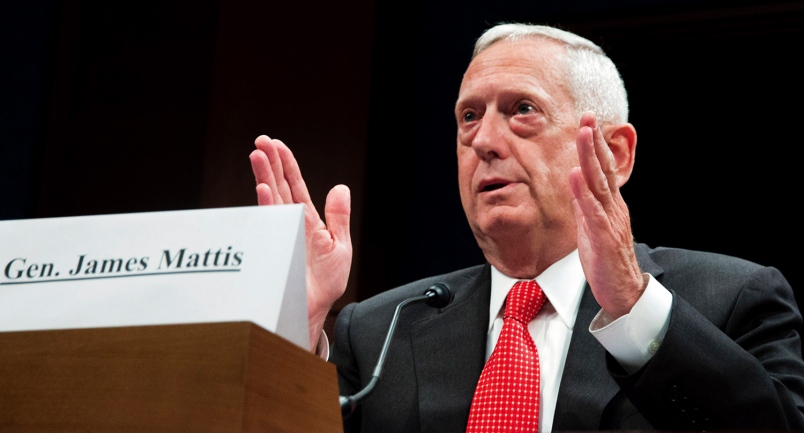
With a firm, “No, I haven’t given any thought” to running for president in answering the first question from the audience, retired Marine Gen. James Mattis returned to discussing the Middle East now that the nuclear agreement with Iran is in place.
The former head of U.S. Central Command, speaking at the Center for International and Strategic Studies, a Washington, D.C., think tank, said Tehran remains “the single most enduring threat to stability and peace in the Middle East” with its continuing rhetoric of “erasing Israel off the map” and toppling the rulers of Jordan and the Gulf states.
“They do mean what they say,” he said.
Broadcast live streaming video on Ustream
Mattis, now with the Hoover Institution at Stanford University, called Iran “a revolutionary cause devoted to mayhem” and said the United States needed to negotiate with it in the same way as it did with the USSR before Mikhail Gorbachev came to power.
As for the Sunni-dominated force controlling parts of Syria and Iraq, “I consider ISIS [another name for the Islamic State] just an excuse for Iran,” a largely Shi’ia nation. “The one country in the Middle East that has not been attacked by ISIS is Iran.”
He said that as the regional combatant commander his first three questions every day were “Iran, Iran and Iran.”
Tehran’s rhetoric and actions have set off a regional arms race, following the signing of the nuclear weapons agreement. “Saudi Arabia just passed Russia as the third largest arms buyer in the world,” he said
Starting with its revolution in 1979 and even after signing the agreement, Iran has “made it very clear they would continue their foreign policy” of revolution. Mattis cited five military threats that are continuing even if it abides by the pact: a latent nuclear weapons program, maritime, ballistic missiles, cyber and using its Quds force in the Syrian civil war and backing proxies such as Hezbollah in destabilizing the region.
Saying the accord was “intrusive” in its inspections for nuclear weapons, he added, “maybe it’s the best we could get” and the United States must realize it is “not a friendship treaty,” but an arms control agreement. Later, he said, “There’s no going back” on it in the next administration.
While buying time, likely 10 years, “we’re going to have to plan for the worst.”
Mattis said there is a struggle inside Iran’s leadership between the hard-core revolutionaries and more moderate factions over what direction the nation should take — especially since some economic sanctions have been lifted. Using the two Koreas as an example, he said the hard-core want the tight control that Pyongyang exercises while the more moderate side sees the benefits of an economic opening to the rest of the world. The leadership “wants it both ways.”
He said, “The U.S. is in a strategy-free mode” when it comes to international relations in the Middle East and beyond that extends from the administration through a Congress that is “willing to sit outside and criticize the President. “We’ve got to be able to walk and chew gum at the same time.”
Mattis said the United States should work with “anti-Iran intelligence agencies in the region” to better understand Tehran’s intentions. “Radio Farsi has to be dusted off again,” to explain to the Iranian people “our side.”
He added that a strong naval presence helps stabilize the Middle East.
In answer to a question on how naval presence does that, Mattis cited the actions he asked the U.S. 5th Fleet commander to take in response to Iran threats to mine the Persian Gulf to cut off oil supplies passing through. He asked the Navy to “put together an anti-mine exercise, not an Iran exercise.” Twenty-nine nations, including Estonia and Singapore, participated in that first exercise. Ten more nations are now participating.
“Tehran realized they were creating a coalition against them” and has since stopped threatening to mine those waters.
Several tweets on the CSIS webcast called for “Mattis 2016.” During his presentation, he drew laughter from the audience when he described a meeting with the king of Jordan to discuss the Syrian refugee crisis. Mattis said he told the monarch that he had “never been a king,” which drew the laughter, and quickly added, “don’t draw anything from that.”





